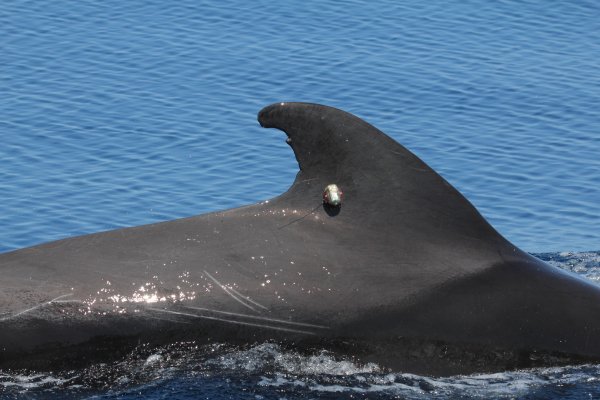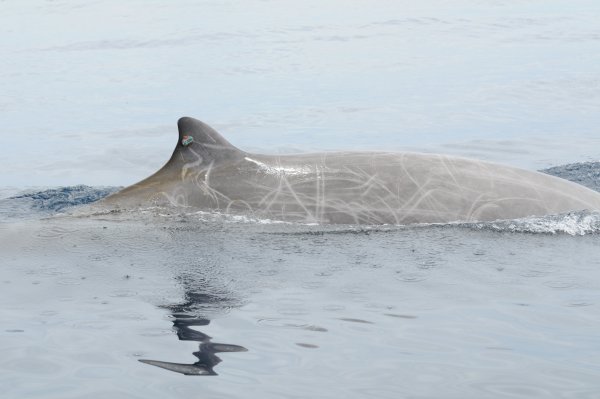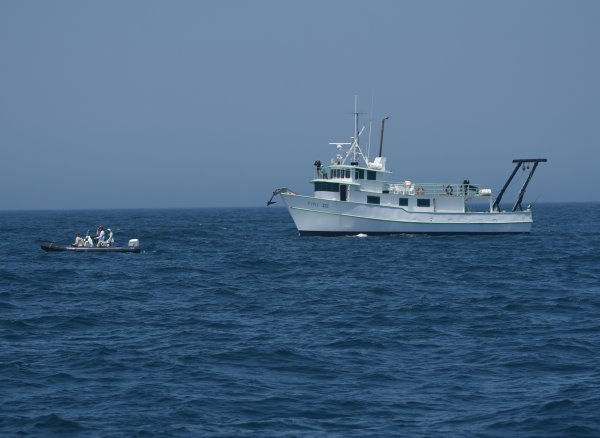Atlantic BRS 2017!!!
Posted on May 22, 2017
Last week we completed the first component of field work in the 2017 Atlantic Behavioral Response Study (ABRS). In this first phase of the field experiment we deployed satellite-linked dive recorders on nine short-finned pilot whales and five Cuvier's beaked whales (our goal was to tag ten pilot whales and five beaked whales). All of the tagged whales are currently transmitting data, allowing us to track the baseline movement and diving behavior of these animals. We have been able to relocate these tagged animals in the field with an ARGOS receiver that provides information on range and bearing in real-time. Given these deployments and ongoing coordination on logistics and communications with the Navy, we are well positioned for the second phase of field work, which will involve a Controlled Exposure Experiment (CEE) currently scheduled for Tuesday, 23 May.
Short-finned pilot whale (GmTag176) equipped with a satellite-linked dive recorder off Cape Hatteras on 16 May 2017. NOAA Permit 14809.
Male Cuvier's beaked whale (ZcTag055) equipped with a satellite-linked dive recorder off Cape Hatteras on 10 May 2017. NOAA Permit 14809.
Interestingly, three of the beaked whales we tagged in the same group on 10 May have continued to exhibit almost perfect synchrony in their diving behavior. Cuvier’s beaked whales make very deep and very long dives, but very little is known about their social behavior, or how it may change in response to potential disturbance. We have now collected more than a week of synoptic data from these three whales; this time series of observations will allow us to ask whether this type of synchronous behavior may change during a CEE.
This past week we also conducted a variety of other preparatory work for the CEE. This included: establishing data exchange protocols between our two research vessels and shore-side data downlinks from the tagged whales; updating HYCOM models to facilitate real-time sound propagation modeling at sea; and a variety of other logistical issues. We attempted to deploy Digital Acoustic Tags D(TAGs) on several pilot whales, including a satellite tagged animal, but weather conditions were marginal and no DTAGs were deployed.
The R/V Exocetus and R/V Tiki conducting tagging operations off Cape Hatteras on 17 May 2017.
The satellite-linked dive recorders will continue to transmit data for several weeks, allowing us to measure the response of these tagged whales to a Navy training exercise involving Mid-Frequency Active Sonar (MFAS). This week we will be coordinating with a guided missile destroyer conducting a regularly scheduled sonar training exercise in the VACAPES OPAREA off Cape Hatteras. If the weather permits, we will equip focal beaked and pilot whales with Digital Acoustic Tags to measure their fine-scale behavioral and acoustic responses. This will augment the broader scale responses of the whales equipped with satellite-linked dive recorders. In addition, the DTAGs will allow us to measure Received Levels of the MFAS signals on the focal animals. If weather conditions do not permit deployment of DTAGs, we will proceed with a MFAS CEE with satellite-tagged animals, using locations (incorporating error estimates) and propagation modeling to estimate ranges of received levels.
We will assess the response of the satellite-tagged whales to this training exercise in several ways. First, we will use the positions of the whales before and after the exercise of the whales to determine whether they move away from the MFAS source. Second, we will examine the diving records of the tagged whales to determine whether they change their behavioral state and, specifically, whether they stop feeding. Finally, we will assess any changes in social behavior, particularly for pilot whales, by conducting focal animal observations from our research vessels.
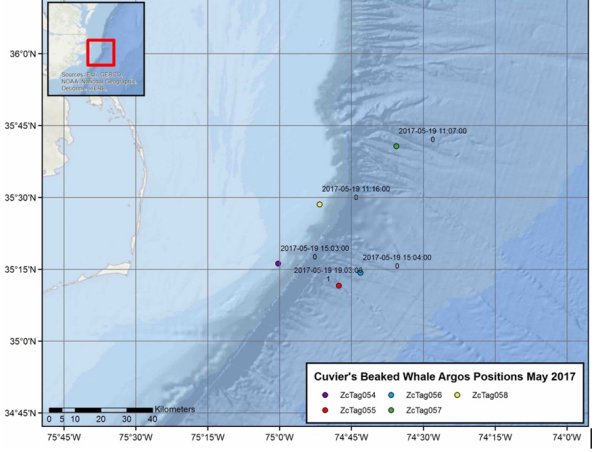
Most recent positions of five satellite-tagged Cuvier's beaked whales off Cape Hatteras as of 19 May 2017.
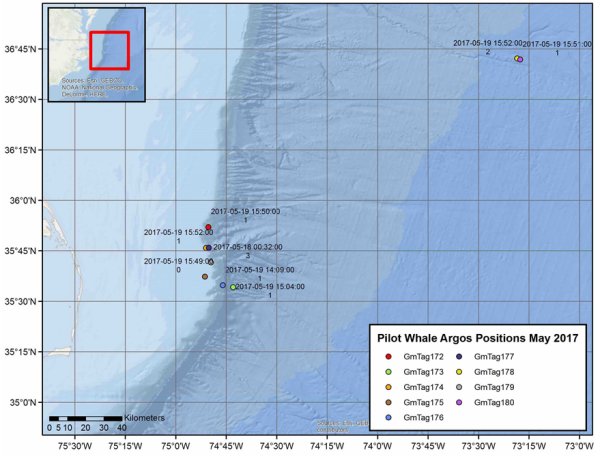
Most recent positions of nine satellite-tagged short-finned pilot whales off Cape Hatteras as of 19 May 2017.
For more information on the Atlantic BRS project including details of the objectives and methods, see our current projects summary as well as the project profile.


